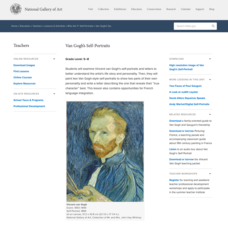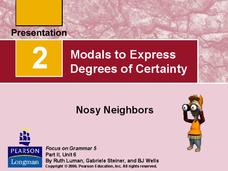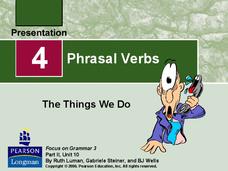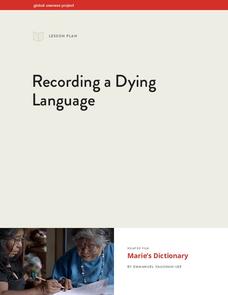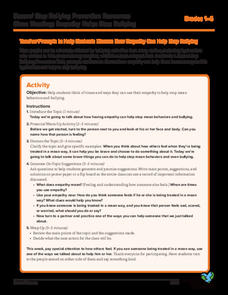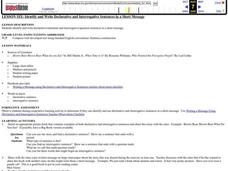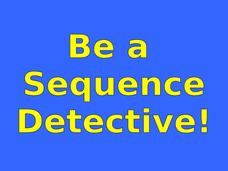National Gallery of Art
Van Gogh’s Self-Portraits
Scholars get to know famous Dutch painter, Vincent van Gogh, as an artist as well as a person. After reading personal letters and analyzing paintings, participants paint two self-portraits that represent their personality. Then, write a...
Curated OER
Poetic Elements
Poetry is all about sound and rhythm. The sound of the words, the rhythm of the lines, and the emotional atmosphere created by these elements and the literary devices poets use, compress whole stories into a few stanzas. The specialized...
PreKinders
Wild Animal Word Cards
Take a walk on the wild side with a set of animal vocabulary cards! Each card includes a picture of an animal and its name in large print for kids to read.
Scholastic
Marijuana: Breaking Down the Buzz
Teenagers get the real information about marijuana use based on the history of tobacco legislation and research. As they read an educational passage about marijuana laws, science, and changing attitudes, they address their preconceptions...
PBS
Journalism Ethics
As a journalist, would you publish everything you heard or saw? Discuss the ethics of journalism with a lesson from PBS. Young reporters imagine themselves to be the editor of their school's newspaper, and as they read five scenarios,...
Pearson
Past Time
How do you talk about things that have already happened? What about things that happened in the past and are still happening? Explore past, past perfect, and past progressive verb tenses in a helpful slideshow presentation.
Pearson
Modals
Ever wonder about the future? Now you know how to speculate in a grammatically correct way! Work on modals to speculate about events from the past, present, and future with a helpful and straightforward slideshow presentation.
Read Works
Famous Inventors Alexander Graham Bell: You Rang?
Scholars read a brief informational text about the famous inventor, Alexander Graham Bell and his invention of the telephone, then show what they know by way of eight questions—six multiple choice and two short answer.
K12 Reader
Identifying Adverbs
Work on adverbs and adverbial phrases with a grammar worksheet. After reading 15 sentences with adverbs, learners circle the adverbs and adverbial phrases and note what question they are answering (when, how, where, and how much).
Curated OER
The Old Man and the Sea: Questioning Strategies
Readers learn to ask questions about text with an activity based on Ernest Hemingway's The Old Man and the Sea. As they read, class members craft questions based on Bloom's Taxonomy and then find the answers themselves.
Pearson
Phrasal Verbs
When is a preposition not a preposition? Learn about the role prepositions play in a slideshow presentation about phrasal verbs. As the class watches the presentation, they reinforce their skills with practice activities.
It's About Time
How Electrons Determine Chemical Behaviors
Lead the class on an investigation as they play detective and locate patterns in the electron arrangement of atoms. During the seventh lesson, they assign valence numbers to elements, organize the periodic table in the correct...
English Worksheets Land
Out to Lunch
Enhance instruction and practice reading with a worksheet that doesn't just ask scholars to identify a sentence's point of view, but also poses the question, How do you know?
Global Oneness Project
Recording a Dying Langauge
Is there value in preserving indigenous languages that are almost extinct? That's the question posed to viewers of a short film about the attempt of one Native American woman who is creating a dictionary for Wakchumni, the language of...
Teaching Ideas
Victorian Posters
Chimney sweeps, street urchins, and Queen Victoria — very different characters living in the very same era. A collection of images enhances any lesson on Victorian England, making a great addition to classroom decoration, slideshows, or...
K12 Reader
Little Women: Helping Father
Jo's decision to sell her hair to bringing her wounded father home is a pivotal and poignant scene from Louisa May Alcott's Little Women. Class members read the excerpt and answer four questions about the details, vocabulary, and plot...
Facebook
Respect and Boundaries
Respect is a must-have in healthy relationships! Pupils explore their boundaries and identify the elements of respect during a lesson plan from a library of digital citizenship activities. The teacher's resource section contains a...
EngageNY
Mid-Unit 2 Assessment: Analyzing Narrative Structure and Author’s Craft: Part 1
Using the resource, scholars complete a mid-unit assessment to gauge their learning at the halfway point of the unit. Pupils read the myth "The Harvest That Never Came" and plot its narrative structure.
Committee for Children
Class Meeting: Empathy Helps Stop Bullying
A lesson instills the importance of how empathy has the ability to aid in stopping bullying behavior. Scholars discuss, in-depth, a series of three questions. Using class input, an anchor chart is made then displayed for reference.
Curated OER
Little Rabbit's Tale: 19
This set of daily spelling activities is intended for use with the story, Little Rabbit's Tale. Learners use the high frequency and spelling words found in the story to complete 4 different activities. They write the long e...
Curated OER
Declarative and Interrogative Sentences
Learners write interrogative and declarative sentences in a short message. After seeing many examples of these types of sentences, students write sentences of their ownl.
Curated OER
Civil Rights: Rosa Parks Centers
Research the Montgomery Bus Boycott and Rosa Parks. Set up different centers and have learners rotate through the activities aimed at researching Rosa Parks. They read The Bus Ride that Changed History: The Story of Rosa Parks, write a...
Curated OER
Getting Hooked, Introduction for a Narrative
How can you interest your reader? Here is a great lesson on reading and discussing the characteristics of a narrative. Elementary schoolers explore writing techniques to hook the reader. They identify their hook and share their...
Roanoke County Public Schools
Be a Sequence Detective!
Authors are constantly leaving clues that help the reader to understand the sequence of events in a story. Teach young readers how to pick up on these key temporal words and phrases with this slide show. After an introduction to commonly...
Other popular searches
- Creative Writing Short Story
- Short Story Writing
- Teaching Short Story Writing
- Esl Short Story Writing
- Fiction Short Story Writing
- Writing Short Story Outline
- Short Story Writing Prompts
- Writing Short Story Rubric
- Writing Short Story Unit


